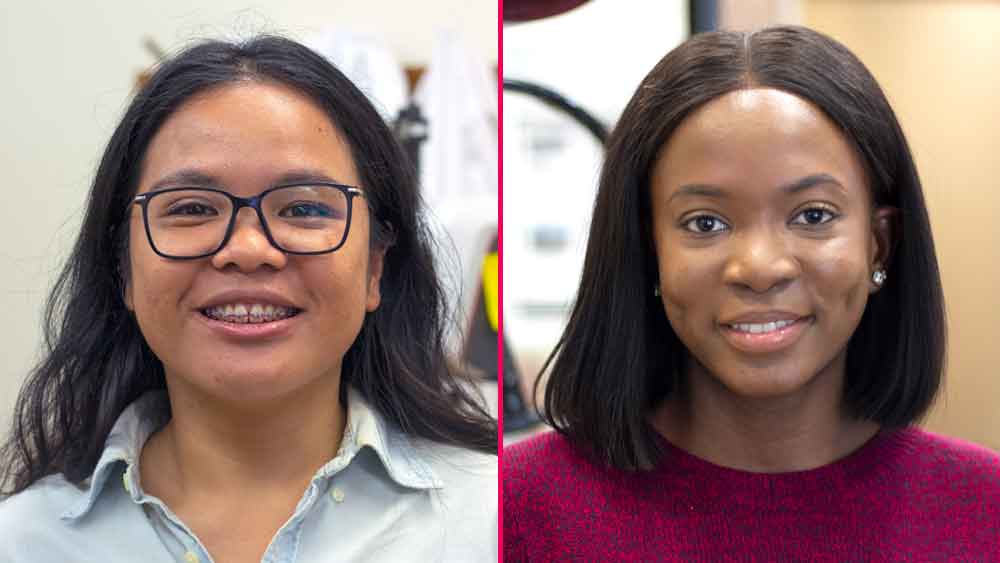
Texas A&M University students won both the doctoral and master’s divisions and took second place in the undergraduate division of the highly competitive Society of Petroleum Engineers’ (SPE) 2021 International Student Paper Contest held during the Annual Technical Conference and Exhibition in late September.
Undergraduate competitor Anthony Small has graduated, but Ph.D. student Debora Martogi and master’s student Oluwatobiloba “Tobi” Adebisi from the Harold Vance Department of Petroleum Engineering took time to discuss how important the student paper contest is.
Paper contests require students to give an oral presentation in front of a panel of judges on their research with an advisor or a problem they are solving by themselves. The three levels of competition include: a local contest held at a university or SPE student chapter, a regional SPE contest and an international SPE contest. Local first- and second-place winners advance to the regional level to compete against students from nearby schools, and regional first-place winners advance to the international level where they compete against others from around the globe. At the final level, all students must submit papers on their work in addition to the oral presentations.
Q: What was it like presenting internationally?
Adebisi: I didn't go expecting to win, I was focused on doing my best and sharing the work that my advisor, Dr. David Schechter, and I and some other members of my research group have been doing.
The competition was virtual, so we had to submit a prerecorded video. That involved going over my slides, reviewing everything and recording the presentation several times. In live presentations, stumbles are fine, but with prerecorded presentations, you're careful to avoid them.
Martogi: There's definitely a lot of editing and repeating. It was more nerve wracking for me in the Q&A session. That was the live section where the judges asked about the work. I did answer one with, "I don't know," but I did well, based on the results.
Adebisi: There were, I think, three or four judges, and I got a question from every single one of them. The Q&A was supposed to be five minutes, but it was roughly 10 because they kept asking questions. They were curious, wanting to dive deeper into what I was doing. Their questions and feedback offered new perspectives on my research.
Martogi: At the local level, the judges were asking, "It's great work, but what do you think about this?" The main thing I learned from that is that sometimes our research tends to stay in academia, especially when it's something new. What they were trying to get out of me is, how is this applicable to the industry? That helped me refine my presentation. I incorporated their feedback because, at the international competition, there are many more industry-related questions.
Q: Can you explain a little bit about your research?
Adebisi: My research is about designing surfactant systems for enhanced oil recovery applications in high-temperature shale reservoirs. Surfactant fluid systems work by altering the rock’s wettability and increasing capillary pressure, basically seeping into the rock and expelling the oil.
And it’s interesting because the range of temperatures we're looking at hasn't been explored before. Typically, studies of these surfactants are done below the boiling point of water. With shale being at the forefront of oil recovery in the United States, and many of these reservoirs have a very high temperature, this opens up a new world of research for us to explore. And we not only explored temperatures, we successfully designed surfactant systems that will function at about 350 degrees Fahrenheit without breaking down.
Martogi: I'm measuring the rock strength and how elastic the rock is in reservoirs using drill cuttings to get high-definition data. Reservoir engineers need these two properties in their simulations to know how the rock deforms or fractures when they develop a well or analyze the reservoir to see how much production they can get out of it.
Most conventional methods to get rock data use core sampling or well logs. These are very expensive and almost always done only in vertical sections because of the risks of tool jamming and instability. But normal drilling produces cuttings from both the vertical and the horizontal sections in all wells. I'm using those cuttings to identify the heterogeneous rock mechanical properties in the areas they actually drill through. This makes it easier and cheaper to know which regions to fracture. We're comparing these analyses with well log analyses, and so far, it's promising.
Q: Are these paper contests significant?
Adebisi: Very significant. As a grad student, you’re focused on the problem you're working on and researching things in that line of thought. Participating in the local paper contest at Texas A&M, then going into regionals and the international contest lets you see all these other interesting problems that people are working on and creating solutions to. It’s interesting being exposed to these problems and unique solutions. It challenges you to be more creative and innovative. And more than that, it piques your interest. How can the work this person is doing influence mine?
Martogi: You also get the diverse perspective of industry people and that’s where you test yourself. Like, can you explain your research in a simple manner to people from different backgrounds and technical disciplines? That was tough for me at first. My advisor, Dr. Sara Abedi, supports me going to conferences and presenting at different industry meetings. Because I get that feedback, my research is refined so that I know what the industry needs. Research is not always implemented. It always comes down to, is it applicable and is it economic to develop?